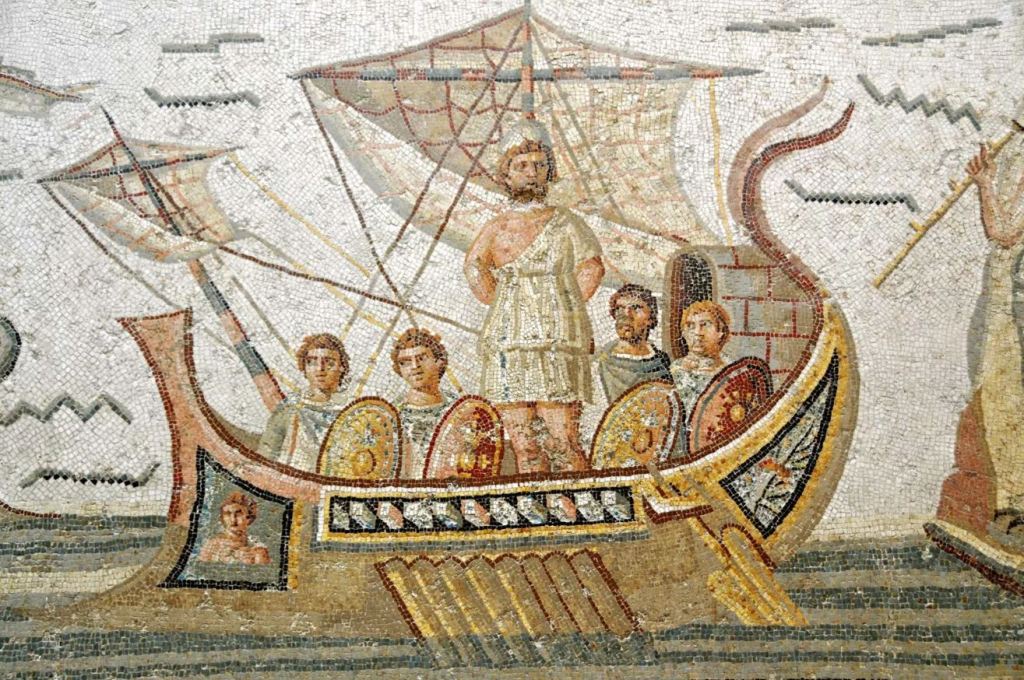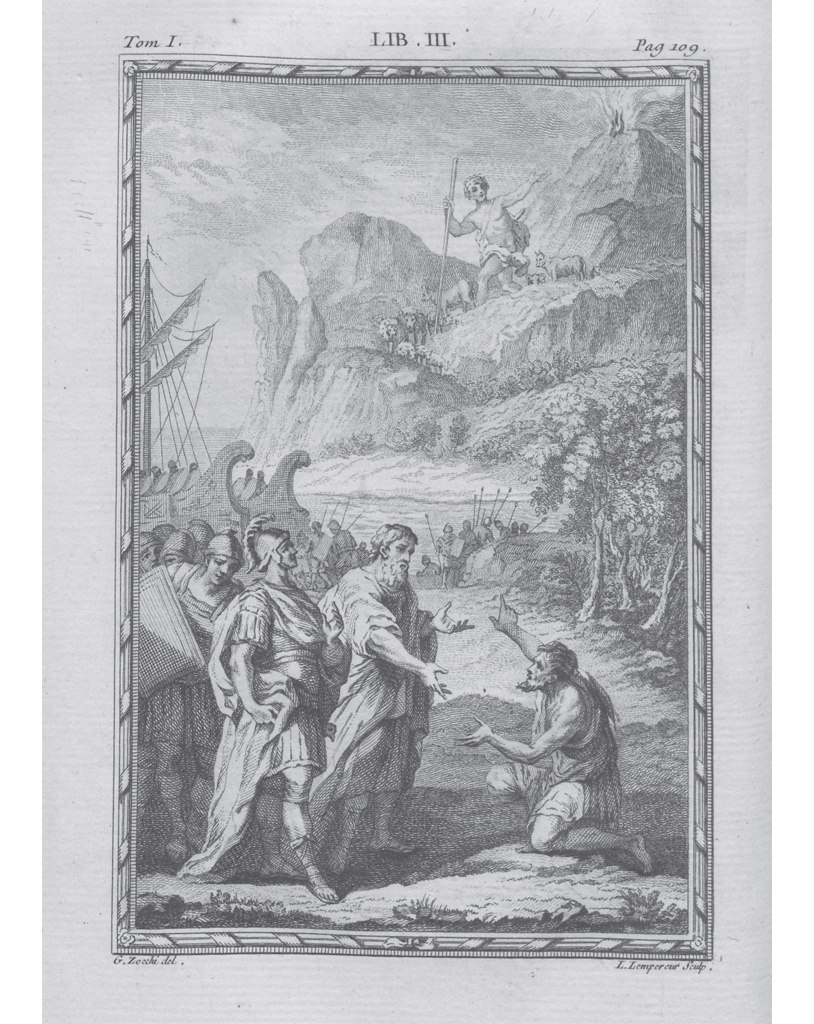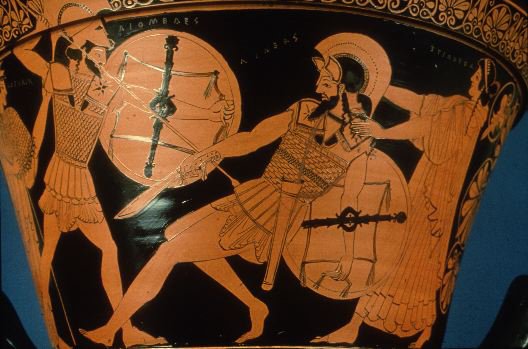homer
Other than Odysseus: Survivors of the Odyssey
Odysseus: We now set out on our odyssey.
Crewman: [raising hand] what’s an ‘odyssey’?
Odysseus: A long journey named after the only survivor.
Crewman: Oh ok… wait… what?!?
An amusing joke for a classicist, which assumes knowledge of the ‘fact’ that Odysseus was the only survivor of his ill-fated attempt to return home to Ithaca after the Trojan War. However, in the course of the second great journey to a homeland after the Fall of Troy recounted in the Aeneid, we find that at least two of Odysseus’ crewman had survived the various encounters with gods and monsters to meet up with the emigrating Aeneas and his crew. It must be said that neither of the names given for these two survivors appear in the Iliad or the Odyssey, which makes it likely that they are later interpolations invented by the Romans to make further connections between the works of Homer and their own burgeoning origin myth.
Achaemenides of Ithaca
The first supposed survivor of the ‘Odyssey’ was met by Aeneas and his followers on the island of cyclopes (Virgil, Aeneid 3.591ff; Ovid, Metamorphoses 14.158ff). As they surveyed the shore, a man “in pitiable plight and half-dead with hunger” with a straggling beard, rags held together with thorns and covered in filth emerged from the woods.
They recognised him as a Greek and he recognised them as Trojans, which gave him the briefest moment of pause, only for his desperation to overcome any fear of the enemy. He begs Aeneas and his men to take him from the island, even if it is to execute him as a Greek enemy, such is the terror and hardship he has endured.Aeneas and his followers urged the man to tell them his name, origin and what he was so scared of, but it was only when Aeneas’ father Anchises offered the man his hand, that he had the courage to reveal his story.
“My native land is Ithaca. I am a comrade of the unfortunate [Odysseus]. My name is Achaemenides. My father Adamastus being poor, I went to Troy – cursed be the day!”
He retells the story of their meeting with the cyclops and the horrors of seeing two of this shipmates killed and eaten by Polyphemos, and then that he had been left behind during the escape. Achaemenides does not explain why he was left behind in the cave – did it require an extra pair of hands to get a man attached to the bottom of a sheep in order to escape Polyphemos’ attention at the entrance of the cave, with Achaemenides therefore the odd man out at the end?
Perhaps the plan had always been for one man to be left in the cave, with those who escaped then making enough noise to attract Polyphemos away from the cave entrance, allowing the last man – chose by lot or volunteering – to then escape. This is what came to pass, only for Achaemenides to be left behind as panic overtook the other escapees and/or, even when blinded, Polyphemos proved still a threat to the Greek crews and their ships.
In the pages of Ovid’s Metamorphososes, Achaemenides explains that he could not cry out to the escaping ships as that would reveal his presence to Polyphemos and the other cyclopes. He could only watch as Polyphemos hurled rocks at Odysseus’s ships, leaving him stranded on the island in constant fear for his life should any of the wild animals or the cyclopes find him.
In terms of how long he had been stranded there, Achaemenides states that he had seen the ‘horns of the moon’ – a crescent moon – three times, suggesting that he had been stranded on the island for at least 5 weeks, if not much more – to see the same version of the ‘horns of the moon’ could take a month at a time. Achaemenides may have been having to eke out a miserable and terrifying existence for over three months.
Any wonder then that he was so happy to see Aeneas and his Trojans making landfall. Even less wonder that he immediately warned his rescuers that they needed to leave. And sure enough, the monstrous Polyphemos appeared lumbering down the mountainside to the shore, using a pine tree to guide him to the sea, where he attempted to wash his wounded eye. The cyclops heard the clamouring of the Trojan escape and chased after them in vain, with his screams bringing down the other cyclopes to see Aeneas’ ships leaving with Achaemenides onboard.
We might ask why Virgil or the Romans in general would invent the character of Achaemenides. It provides a direct connection between the Aeneid and the Odyssey from the Greek side of things and allows Virgil to show how magnanimous Aeneas could be in saving a member of Odysseus’s crew, and bearing little grudge over the destruction of Troy. And in return for this magnanimity, Achaemenides not only gives his loyalty to his Trojan rescuers and immediately exhorts them to flee the island, he is also able to serve as a useful source of knowledge for Aeneas going around the islands and shores he had already visited.
Macareus of Neritus
The second survivor of the Odyssey other than Odysseus is spoke of in Ovid’s Metamorphoses. It has it that this second survivorwas found by Aeneas’ expedition after it emerged from the Stygian realms near the Euboean colony at Cumae. Arriving on the shore that he would name after his nurse, Caieta – that is the Bay of Gaeta, Aeneas discovered another “Greek had found a home” there. This was Macareus, originally from the town of Neritus on mainland Acarnania in western Greece.nMacareus immediately recognises Achaemenides, shocked to find him still alive…
“what chance or what god saved you, Achaemenides? Why does ship belonging to the barbarous Trojans carry a Greek on board?”
Once he describes his ordeal with the cyclops and explains how he owes the Trojans his unending gratitude due to their saving him from the island, Achaemenides then enquires about Macareus’ travels after the escape from the cyclopes.
Macareus recounts how Odysseus’ received the winds of Aeolous, which after 9 days brought then fleet within sight of Ithaca, only for the jealous crew to open the bag they were contained in thinking that Odysseus was concealing gold from them. This saw the ships carried all the way back to the harbour of Aeolus. At their next stop, Macareus was chosen along with two other crewmates to treat with Antiphates, king of the Laestrygonians, only for one of his comrades to be eaten by the cannibal ruler. The other crewman and Macareus escaped back to Odysseus’ ship, but it was only one to survive the encounter with the Laestrygonians, with the other ships destroyed and their crews either drowned or eaten…
This single ship then makes landfall at an island off the coast of Rome called Aeaea, which could supposedly be seen from the Bay of Gaeta as Macareus points to it in his retelling (it is a mythical island). Macareus warns the Trojans to stay away from there as it is the island of Circe…
Macareus tells of how he was again chosen by lot, along with 21 others to make contact with the inhabitants of the island. They were welcomed with a banquet by Circe, who gave them a concoction that turned them all, bar one, into pigs (this transformation and another story of Circe’s powers is why Ovid recounts the survival of Macareus).
“… my body began to bristle with stiff hairs, and I was no longer able to speak, but uttered harsh grunts instead of words. My body bent forward and down, until my face looked straight at the ground, and I felt my mouth hardening into a turned up snout, my neck swelling with muscles. My hands… now left prints like feet upon the ground.”
Macareus and his pig brethren were shut up in a pigsty and were only saved due to one of their original number, Eurylochus, having refused to drink the concoction. He escaped to inform Odysseus, who protects himself from Circe’s magic by taking moly. Surviving his own drinking of the concoction untransformed, Odysseus persuades Circe to turn his men back. The crew then spent a year living on Aeaea, where Macareus hears may stories of the power of Circe, including that of Picus and Glaucus.
When the crew finally departed Aeaea, Circe “told us of the dangerous voyagings, the long, long journey and perils of the cruel sea” they were still to face, which thoroughly frightened Macareus, who jumped ship when it reached the Bay of Gaeta, where he decided to remain. This decision saved his life. Had he stayed onboard, Macareus would have been fated to die at the hands of Scylla or in the shipwreck caused by Zeus in retaliation for the crew’s hunting of Helios’ sacred cattle on the island of Thrinacia; it was this shipwreck that saw Odysseus become the ‘sole survivor’ of the Odyssey.
Both Achaemenides and Macareus are used as storytellers in the Aeneid and Metamorphoses. Ovid, in particular, in having Achaemenides and Macareus meet, demonstrates how history has been passed down orally, becoming a coherent story in the process before being committed to writing. The lack of mention of these men in the Odyssey suggests that they were made up almost expressly for this purpose, taking advantage of there being so many crewmates on Odysseus’ voyage who are not named.
If such a story-telling device was to be used today, it would be considered ‘fanfiction’ and/or extrapolating of a story that did not need to be told from minutiae or unimportant gaps in a larger story. For Virgil, it was a way of further anchoring his much later addition into the story of the Homeric cycle.
Before the Romans Got Hold of Him: Aeneas in the Iliad
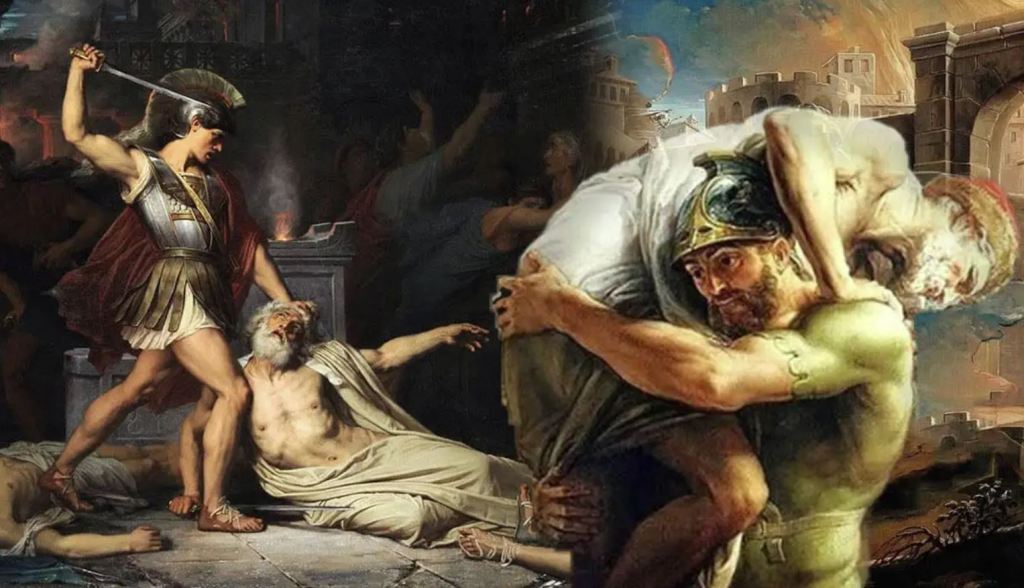
You might see people opining that the story of say the Star Wars movie Rogue One is built upon a question that no one really needed answering – why has an exhaust port connected to vital systems of the Death Star been left unshielded? You might also think that latching on to such minutiae, minor characters or embellishing an established story was the preserve of modern Hollywood film studios or fanfiction produced by people who just want more from their favourite stories and characters; however, it is a much older and well-established literary idea than you might think. Some of the most famous writers and stories are just such embellishments and ‘fanfiction.’
William Shakespeare put words in Mark Antony’s mouth for the ‘Friends, Romans, countrymen’ funeral oration he gave for Julius Caesar; different words than recorded by the likes of Appian, BC II.144-147, who may even have had a report of what was said in 44BC. When it came to speeches given before or during the Peloponnesian War, Thucydides admitted to making “the speakers say what was in my opinion demanded of them by the various occasions, of course adhering as closely as possible to the general sense of what they really said.” (Thucydides I.22.1)
Even the Iliad itself is a poetic retelling of a (seemingly) historical event embellished with fantasy elements and loans from other older works and myths such as the Epic of Gilgamesh. If I were being mean, I would say that a modern equivalent for the Iliad in terms of genre fiddling is the movie 300, which took the historical setting of the Persian invasion of Greece and the Battle of Thermopylae and added various fantastical elements such as monsters and seemingly divine beings… It could even be argued that the Odyssey is merely a spin-off of the Iliad, latching on to one specific character in Odysseus and telling a story of his attempts to return home on the background of the Trojan War.
And the same can be said of Virgil’s Aeneid, which does something similar thing, rehashing/remaking the genre outlines of the Iliad and the Odyssey, only with a more minor and “fairly vague” (Williams (1985), 28) character. And yet, the Romans had created an entire mythos on the foundation of their city around this “fairly vague” character centuries before Virgil composed the Aeneid, possibly replicating how Greek colonists created connections between their new homes and the mythology of the Aegean world (Kinsey (2012) 18).
So what does the Iliad tell us about Aeneas that would make him a viable and attractive candidate for the Romans to build a foundation myth around?
Beyond his personal survival of the Trojan War, the most attractive thing about Aeneas as a link back to the ‘old world’ of the Aegean was his genealogy. He was a member of the Trojan royal family, specifically its offshoot branch that ruled the city/area of Dardania, the troops of whom he commanded during the Trojan War for his grandfather, Capys, then ruler of Dardania.

In terms of his place in the Trojan royal family, Aeneas was connected to King Priam in two ways. Through his grandmother, Themiste, who was a (half-)aunt of the Trojan king, Aeneas was a first cousin once removed of Priam (Themiste having married Capys, despite them being first cousins). Through his patriarchal line – Anchises > Capys > Assaracus, he was also a second cousin once removed of Priam, with Assaracus being a brother of Priam’s grandfather. This made Aeneas both a second and third cousin of Priam’s children, including Creusa, who would be Aeneas’ first wife.
However, even more useful for the Romans in terms of legitimacy and prestige was the identity of Aeneas’ mother. Whilst tending his herd of cattle on Mount Ida, Anchises was seduced (on the meddling of Zeus) by the goddess Aphrodite (Illiad 2.819 cf. 5.247, 5.313), who then gave birth to Aeneas. The Julians would claim divine descent from Venus/Aphrodite through Aeneas’ son, Ascanius, whom they identified with Iulus, the mythical ancestor of the entire clan. Another version has Iulus be the son of Aeneas and Creusa, while Ascanius was Aeneas’ son by Lavinia.
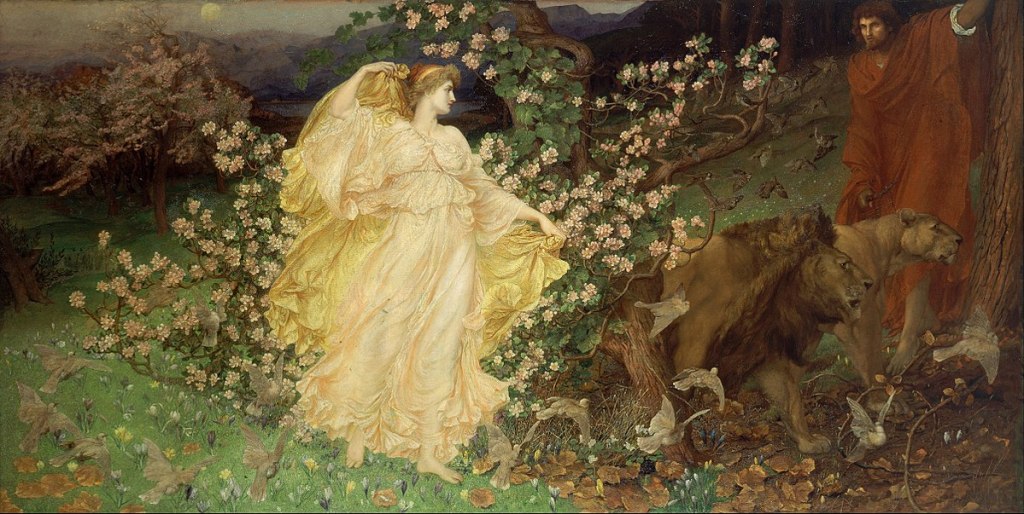
This divine heritage would prove of considerable help to Aeneas during the Trojan War, as his position within the Trojan royal family and captain of Dardanian forces saw him serve as a prominent lieutenant to his cousin, Hector. This in turn saw him play an active role in the fighting and shows himself to be a brave and skilled warrior and leader.
He is recorded slaying several named men – Crethon and Orsilochus, sons of Diocles, Aphareus, son of Caletor, Medon and Iasus and Leocritus, son of Arisbas (Iliad 5.541, 13.541, 13.541, 17.343). Some prominent Greeks thought twice about fighting Aeneas alone – the Trojan prince challenged Menelaus, but had to withdraw when the Spartan king brought back up (Iliad 5.541), a lesson that Aeneas seemingly learned for when he later challenged Idomenus, the Trojan brought his own back in case the Greek replicated Menelaus, which he did, leading to a group fight rather than a duel (Iliad 13.500). In Books 6 and 11, he is seen in prominent leadership roles, charged by Helenus (another son of Priam) with organising the defence of Troy, alongside Hector, and then assaulting the walls of the Greek camp. Aeneas also rallied the Trojans when they were in trouble during the fighting over the corpse of Patroclus (Iliad 17.323).
His achievements saw Aeneas “honoured by the people like a god” (Iliad 11.58). This also might seem like a comment on his divine heritage, but then Aphrodite being his mother was supposed to be a secret (Anchises was struck by lightning from Zeus for bragging about his divine liaison). Furthermore, others in the Iliad are described with similar words, although this would seem to present “honoured by the people like a god” as a known demonstrating a form of respect.
It could be that Aeneas was not above holding himself in high regard. He claimed to be as good as Hector (Iliad 5.467; cf. 6.78), and in Book 16, he shows shock and anger when Meriones luckily avoids being killed by his spear throw. Aeneas’ self-confidence even went as far as to display annoyance at Priam for not honouring him sufficiently, despite his ability and skills (Iliad 13.460). It can only be speculated as to what was at the heart of this annoyance with Priam as Homer does not go into any detail. Might the Trojan king have been put out by the love showed by the Trojans to this Dardanian captain, over and above his own children, except Hector?
While he did fight and defeat several individuals, it could be that Aeneas was brave and confident beyond his actual martial ability. The likes of Idomenus and Menelaus might have been wary of Aeneas’ prowess, but it came to the next level of fighters, Aeneas was found somewhat wanting.
When he squared up to Diomedes alongside Pandarus, not only was his colleague killed, but Aeneas lost his great horses (descended from the immortal steads of Zeus), fails to defeat the now unarmed Diomedes and is then severely wounded by his opponent throwing a huge stone at his hip (Iliad 5.225).
And yet, while he had failed to make much impression against perhaps the second best warrior of the Greeks, Aeneas allowed himself to be talked into squaring up to the Greeks’ greatest warrior, the rampaging Achilles.
To be fair, it was Apollo who encouraged this challenging of Achilles, and Aeneas was initially inclined to not listen due to recognising his own limits in the face of the skill of Achilles; however, Apollo points out that Aeneas is the son of Aphrodite, while Achilles is only the son of a nymph and will therefore be protected in the duel.
After an exchange of threats and insults, during which Achilles reveals that the two have fought before, hitherto unmentioned, that Aeneas had been lucky to survive, and that the Trojan was only taking up this gauntlet again for the potential glory to increase his chances of ruling Troy (Iliad 20.84-109).
When the duel begins, it is a quick affair. Aeneas strikes first, his thrown spear finding its mark, only for it to rebound harmlessly off Achilles’ armour made by Hephaestus. Achilles’ first strike knocks Aeneas’ shield from his hands.
Unarmed, Aeneas looks to lift a large stone to defend himself, but the sword-wielding, swift-footed Achilles is going to strike the fatal blow… and then… nothing. Aeneas was not struck down. Instead, he was whisked away from danger by divine intervention.
This was not the first time the gods had deigned to save Aeneas – he had only survived his duel with Diomedes due to first Aphrodite and then Apollo (Iliad 5.225; cf. 5.344). This would have been enough to suggest that Aeneas and anyone descended from him was divinely protected, but the climax of the (second) duel with Achilles will have removed all doubt.
Instead of Aphrodite or Apollo, it was Poseidon who saved Aeneas from Achilles (Iliad 20.291-340). This raises a significant question – whilst Aphrodite was his mother and Apollo had always viewed him as a favourite, why did Poseidon, who had sided with the Greeks throughout the war, come to Aeneas’ aid (Iliad 20.291-340)?
Even before looking for reasons given in the sources, you would be forgiven for thinking that this was only further fuel to the notion of a significant destiny surrounding Aeneas and his descendants, one that the Romans would not be slow to play up.
And when you then read Poseidon’s own reading of the situation, you can see why the Romans might have felt that Aeneas was a worthy progenitor.
“Now look you, verily have I grief for great-hearted Aeneas, who anon shall go down to the house of Hades, [295] slain by the son of Peleus, for that he listened to the bidding of Apollo that smiteth afar—fool that he was! nor will the god in any wise ward from him woeful destruction. But wherefore should he, a guiltless man, suffer woes vainly by reason of sorrows that are not his own?—whereas he ever giveth acceptable gifts to the gods that hold broad heaven. [300] Nay, come, let us head him forth from out of death, lest the son of Cronos be anywise wroth, if so be Achilles slay him; for it is ordained unto him to escape, that the race of Dardanus perish not without seed and be seen no more—of Dardanus whom the son of Cronos loved above all the children born to him [305] from mortal women. For at length hath the son of Cronos come to hate the race of Priam; and now verily shall the mighty Aeneas be king among the Trojans, and his sons’ sons that shall be born in days to come.”
Iliad 20.294-308
Not only did the god of the seas, storms and earthquakes think that Aeneas did not deserve to die for following the poor advice of Apollo in squaring up to Achilles, Poseidon almost seems to think that the line of Dardanus is not fated to be extinguished at Troy. Or at least that Zeus does not want the line of Dardanus to die out (Iliad 20.303-305).
That still does not necessarily explain why Poseidon himself needed to act to save Aeneas. If Fate was on the Dardanian prince’s side, presumably any god could have saved him, including Aphrodite (although she had proven susceptible to injury when she tried to save Aeneas from Diomedes) or Apollo. Of course, having yet another god acting in Aeneas’ favour, and one of the ‘Big Three’ no less, along with the claims of the coming glory for him and his line only makes him more attractive to the Romans.
This declaration by Poseidon on Aeneas also contains two other important characteristics of Aeneas. It highlights Aeneas’ piety – “whereas he ever giveth acceptable gifts to the gods that hold broad heaven” (Iliad 20.299), something which could be reflected in the divine aid he received on several occasions. Even his listening to Apollo’s poor advice could be seen as piety towards the gods. He also showed piety in other ways, such as his leading of the attack on Idomenus to recover the body of his dead brother-in-law and in his carrying of his injured father away from the sack of Troy. Pseudo-Apollodorus considered Aeneas to have been pious enough that “the Greeks [spared] him alone” (Ps-Apollodorus, Epit. V.21).
The second extra characteristic given to Aeneas by Poseidon is that he was “a guiltless man” (Iliad 20.297), and therefore spared the destruction of Troy, which was to be seen as the result of wrathful gods punishing offences inflicted on them by the Trojans (cf. Iliad 4.160-168, 13.622-625, 16.384-392, 21.522-524). The guilt of the Trojans might be the cheating of Poseidon, Apollo and Hercules by Priam’s father and predecessor as king, Laomedon, for services rendered to the city – the gods having built Troy’s walls and Hercules having saved Laomedon’s daughter from a sea monster (cf. Edwards (1991) 325).
Aeneas’ piety, his not being a descendent of Laomedon (great uncle/nephew through Themiste and first cousin twice removed through Capys) and the potential that the Dardanians were not tarnished by the abduction of Helen (Edwards (1991) 325) all seem to have shielded him from Trojan guilt.
This in turn seems him posited as the ‘one just man’ in the Iliad, a trope that appears in other ancient works such as Utnapishtim’s survival of the deluge in the Epic of Gilgamesh, Lot’s escaping from the destruction of Sodom and Gomorrah for protecting two angels from a mob in the Book of Genesis and Baucis and Philemon escaping the flood of Phrygian Tyana for showing theoxenia towards Zeus and Hermes in Ovid’s Metamorphosis. Of course, Aeneas was not the only survivor of the Fall of Troy, with his father and son escaping the city with him and several other refugees joining up with him to form the group who would settle in Italy.
Given that he was a Trojan prince, might there have been an element of anti-Greek sentiment in the Roman choice of Aeneas as their ‘progenitor’? The opponents of the Roman state in the 4th/3rd centuries BC included the Greek city-states of Magna Graecia, that is southern Italy and Sicily. Claiming descent from one of the oldest Greek enemies in Troy differentiated the Romans more from the Greeks who had had such an influence on their actual origins and culture.
Certainly, if the Romans had wanted to pick a Greek survivor of the Trojan War, they had plenty to choose from. For example, Diomedes not only took part in the successful sacking of Troy, emerging from the Trojan Horse, he was favoured enough by the gods for his nostoi turn home to Argos to only take 4 days. He then emigrated to Italy, where he became the founder of many towns and cities, including Beneventum and Brundisium. Surely, he would be a suitable candidate should the Romans have wanted a Greek ancestor. Indeed, Diomedes appears in the Aeneid – called “the bravest of the Greeks” (Aeneid 1.96) by Aeneas – as a potential ally of Turnus against Aeneas, only for the former Argive king to state that he had fought enough Trojans and encourage the Rutulian king to make peace with Aeneas (Aeneid 11.282-284).
To sum up then, whilst Aeneas might not appear in the Iliad as much as we might think given that he receives a Roman spin-off, he receives enough attention to present a multi-faceted character with numerous attributes that would be found attractive to a people searching for a progenitor.
He was (1) royal, both among the Dardanians and a scion of the Trojan royal family; he was (2) a skilled warrior, capable of defeating or at least worrying some of the best amongst the Greeks; he was also (3) brave enough to show a willingness to take on men he had little chance of beating; more than once he is shown to be a (4) leader of men; his (5) piety towards his family and the gods, along with his origins, fed into his being (6) guiltless and just; his origins were not only royal, they were (7) divine through his mother, Aphrodite, and Poseidon posited that he was in some way protected by (8) destiny/Fate. And most importantly for his usefulness as a connection between the archaic Aegean to ancient Italy, Aeneas was (9) a survivor of the Trojan War through a combination of all of the above traits.
Bibliography
Edwards, M.W. Homer: Poet of the Iliad. Baltimore and London (1990).
Edwards, M.W. The Iliad: A Commentary Volume 5: Books 17-20. Cambridge (1991)
Kinsey, B. Heroes and Heroines of Greece and Rome. New York (2012).
Louden, B. ‘Aeneas in the Iliad: The One Just Man’ El Paso (2006) https://camws.org/meeting/2006/abstracts/louden.html
Nagy, G. The Best of the Achaeans. Concepts of the Hero in Archaic Greek Poetry. Baltimore (1979)
Williams, R.D. Aeneas and the Roman Hero. London (1985)
‘Aeneas in the Trojan War’ https://www.romaoptima.com/roman-empire/aeneas-in-the-trojan-war/

